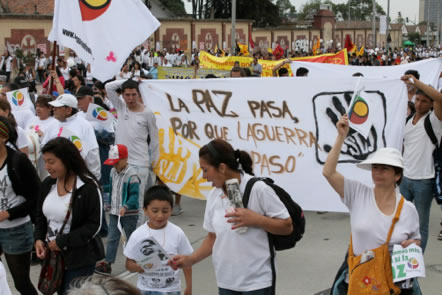|
The Victim Assistance and Reparations Unit, known as the Victims' Unit,
began to function in January 2012. This body, established under the
Victims' Law, is in charge of formulating and implementing public policy
on reparations as well as the coordination of the National System for
Assistance and Reparations for Victims (SNARIV), comprising a group of
national and regional public institutions. Amongst their activities, the
Victims' Unit is in charge of the Victims Registry; the humanitarian
aid measures; compensation to the victims; and individual and collective
reparation plans.
Land Restitution Unit
The Land Restitution Unit started work in January 2012 as the
institution charged with drawing up the legal procedure for restituting
and legalizing the land of the victims of land theft and forced
abandonment in the context of the internal armed conflict. Amongst its
functions, the Land Unit is charged with creating a registry of stolen
and abandoned land; of receiving victims' claims; studying each case;
amassing evidence; and preparing the lawsuit which will be presented to a
land judge. When restitution of the plot is not possible, the State
will pay due compensation to the victims of land theft and displacement.
Land Judges
On June 15th, 2012, the first lawsuit was presented to the Land
Restitution judges. These are civil circuit court judges, specialized
in restitution of land in accordance with the Victims' and Land
Restitution Law. In cases where there are no adversaries in the
process, they hear and decide upon, in sole instance courts, the land
restitution cases and the legalization processes of the land deeds of
people whose lands have been stolen or who were forced to abandon their
plots.
National Historical Memory Center
The National Historical Memory Center was set up at the beginning of
2012, in accordance with Law 1448, as the body charged with promoting
processes that guarantee the right of victims and the whole of society
to the reconstruction of historic memory. To do this, the Center,
amongst other functions, must "gather together and recover all the
documentary material, oral testimony, and any other material relevant to
violations", and create and manage a human rights and historical memory
program and a memory museum. The Center is also charged with
developing the Agreements to contribute to clarification of the truth
created by Law 1424.
Legislative Act 01 of 2012, or "Legal Framework for Peace"
After intense debate in the country, the constitutional transitional
justice reform known as the Legal Framework for Peace was passed in the
middle of 2012, through legislative Act 01 of 2012. On the basis of
this reform the State possesses integrated transitional justice
instruments geared towards facilitating negotiations and achieving a
stable and durable peace. The proposal authorizes the creation of
extrajudicial justice mechanisms, establishment of criteria for the
prioritization and selection of cases, suspension of sentences, and
relinquishing the right to prosecute the crimes that were not selected.
Law 1592 of 2012, or "Reform of Justice and Peace Law
In 2012 Law 1592, which reformed Law 975 of 2005, came into effect with
the aim of increasing the efficiency of the processes that were taken
under this transitional justice mechanism. This reform redirects the
investigative focus in order to look at structures responsible for
systemic crimes, relying on intelligence led investigations as opposed
to more traditional atomized incident based investigation. The concept
of victim is complemented by the concept of collective harm and the
reparations hearing is modified, replacing it with the hearing to
establish damages, according to which, the calculation of compensation
will be undertaken by the Victims' Unit and will be made in conformity
with Law 1448 of 2011. Amongst the changes, was the definition of the
causes of exclusion from the Justice and Peace process, such as the
failure of the postulados to hand over assets.
|
https://www.ictj.org/colombia-timeline/index_eng.html

No comments:
Post a Comment